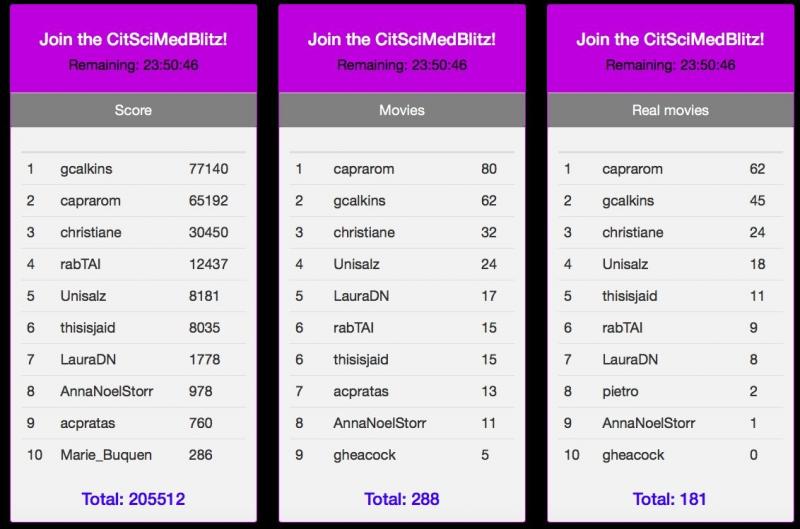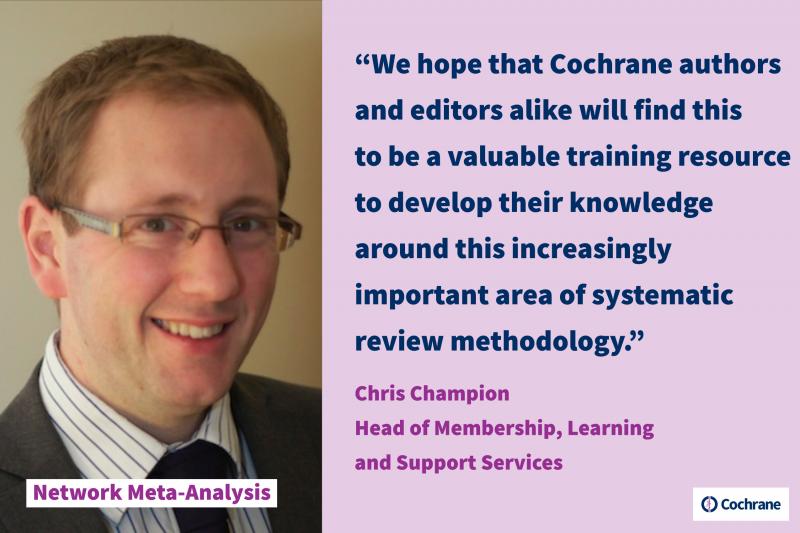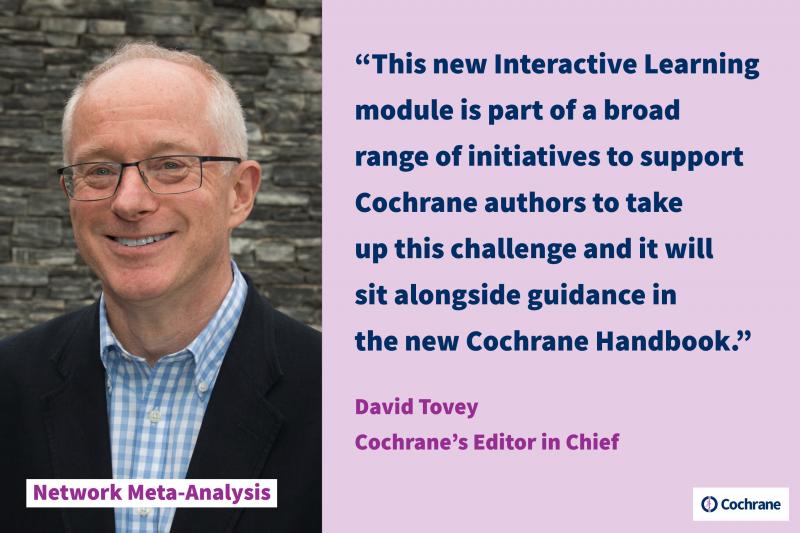Cochrane Crowd joined forces with two other Citizen Science platforms, Mark2Cure and Stall Catchers, for CitSciMed Blitz. Read on to hear how the blitz led to some “firsts” for Cochrane Crowd, and for prize winner announcements.
Anna Noel-Storr from Cochrane Crowd met Ginger (Mark2Cure) and Pietro (Stall Catchers) at the CitSci2017 conference in St Paul, and they’ve been keen supporters of each other’s platforms ever since. Readers will remember Cochrane Crowd and Mark2Cure joined forces for last year’s MedLit Blitz. When it came time for this year’s blitz, the three platforms collaborated for the first time. Each platform ran a 24-hour challenge within a one-week period, with contributors encouraged to participate in all three challenges.
One of the beauties of a collaborative blitz lies in members of each platform being introduced to the other platforms. Seeing regulars from Mark2Cure and StallCatchers pop up on the Cochrane Crowd leaderboard was exciting, and seeing Anna appear on the Stall Catcher leader board, albeit briefly, was also quite a thrill!

This blitz was also a first for Crowd in a technical sense. It was the first challenge event Crowd has run using the Cochrane Classmate interface. This meant Anna and Emily from Crowd could communicate directly with participants throughout the challenge, adding an element of live feedback that hasn’t been possible before.

Without further ado, let’s look at the prize winners!
The overall winner of CitSciMed Blitz, with the highest ranking across the three platforms, was Michael Landau. The grand CitSciMed Blitz trophy is being custom made for Michael and will be sent to him shortly.
Including Michael, 14 people took part in all three challenges and will henceforth be known as CitSciMed Blitz triathletes! The triathletes are Michael Landau, Michael Capraro, Kien Pong Yap, Tom Adams, Stephanie Johnson, Chadia Khatib, Guy Calkins, Alex Freeman, Zoe Wilkinson, Samuel Ognenis, Christiane de Becker, Laurie Cochran, Andama Adinan, Olivia and Nicole.
The top ranked contributor for each platform will also receive a CitSciMed Blitz trophy.
The winner of the Stall Catchers trophy was Michael Capraro, who took the leader position in the Stall Catchers challenge finishing 1st at score, total movies, and real (non-training) movies analysed. The winner of the Mark2Cure trophy was Kien Pong Yap. And finally, the winner of the Cochrane Crowd trophy was Nikolaos Sideris who screened a whopping 5188 citations over the 24 hours.
Each platform has also awarded prizes to runner-up contributors, and those who ranked 2-10 in the Cochrane Crowd challenge will receive a signed copy of Iain Chalmer’s book Testing Treatments. They are Therese Dalsbø, Kien Pong Yap, Deirdre Beecher, Dhasarathi Kumar, Michael Landau, Karen Ma, Tom Adams, Jayapradha and Michael Capraro.
Congratulations to all prize winners!
Cochrane Crowd extends a huge thank you to all the Citizen Scientists who took part in CitSciMed Blitz, and a special welcome to those who contributed to health evidence through Cochrane Crowd for the first time. Thanks also to Pietro and Egle from Stall Catchers and Ginger from Mark2Cure for their great company and adventurous spirits.
The team at Cochrane Crowd plan to run annual collaborative blitzes with Mark2Cure and Stall Catchers, and plans are afoot to make them bigger and even better. The next one will coincide with Citizen Science Day 2019.
You can read CitSciMed Blitz wrap ups from Mark2Cure and Stall Catchers, here and here.
To contribute to Cochrane Crowd, sign up to the platform here. For more information about Cochrane Crowd email crowd@cochrane.org, and follow us on Twitter.
Support for Project Transform was provided by Cochrane and the National Health and Medical Research Council of Australia (APP1114605). The contents of the published material are solely the responsibility of the Administering Institution, a Participating Institution or individual authors and do not reflect the views of the NHMRC.









 Jo has more than 20 years’ experience in print and broadcast journalism and as a senior executive and communications specialist. She joined Cochrane in 2014 as Media and Communications Officer, and during the last four years has worked with Cochrane Groups, authors and editorial teams to increase the coverage, reach, accessibility and impact of Cochrane’s evidence around the world. She designed and implemented media and dissemination plans, was central to the development of Cochrane’s new brand identity and led the Central Executive Team’s events management support for the Global Evidence Summit last September. She has a proven track record of leadership roles within global organizations, including the BBC, commercial media, and digital content production companies managing international multi-disciplinary teams.
Jo has more than 20 years’ experience in print and broadcast journalism and as a senior executive and communications specialist. She joined Cochrane in 2014 as Media and Communications Officer, and during the last four years has worked with Cochrane Groups, authors and editorial teams to increase the coverage, reach, accessibility and impact of Cochrane’s evidence around the world. She designed and implemented media and dissemination plans, was central to the development of Cochrane’s new brand identity and led the Central Executive Team’s events management support for the Global Evidence Summit last September. She has a proven track record of leadership roles within global organizations, including the BBC, commercial media, and digital content production companies managing international multi-disciplinary teams. Chris Champion has been part of Cochrane for more than eight years. Having developed his editorial skills at Oxford University Press he joined Cochrane as a Managing Editor in 2009 working first at the Developmental, Psychosocial and Learning Problems Group, and then at the Common Mental Disorders Group in Bath, UK. After five years as a Managing Editor he was appointed as Senior Advisor to Cochrane’s Chief Executive Officer, and in 2015 became Senior Programme Manager in the CEO’s Office. Having worked in Cochrane’s Review Groups, participated in and led various Cochrane committees, and more recently been the lead on several major Strategy 2020 initiatives such as the structure and function projects, the formation of the Knowledge Translation framework, and developing and implementing the new Cochrane Membership scheme, Chris has a real depth of understanding of Cochrane and our community and is therefore well placed to understand and deal with the challenges that the new Membership, Learning and Support Services department will face.
Chris Champion has been part of Cochrane for more than eight years. Having developed his editorial skills at Oxford University Press he joined Cochrane as a Managing Editor in 2009 working first at the Developmental, Psychosocial and Learning Problems Group, and then at the Common Mental Disorders Group in Bath, UK. After five years as a Managing Editor he was appointed as Senior Advisor to Cochrane’s Chief Executive Officer, and in 2015 became Senior Programme Manager in the CEO’s Office. Having worked in Cochrane’s Review Groups, participated in and led various Cochrane committees, and more recently been the lead on several major Strategy 2020 initiatives such as the structure and function projects, the formation of the Knowledge Translation framework, and developing and implementing the new Cochrane Membership scheme, Chris has a real depth of understanding of Cochrane and our community and is therefore well placed to understand and deal with the challenges that the new Membership, Learning and Support Services department will face.






